Fit Life
January 20, 2016
If you are beginning an exercise program, you have probably heard that developing core strength is important. Although true, your goal at the start of an exercise program should be to reestablish stability and mobility in your body, which begins at the center of mass and the core. Thus, you want to develop stabilization throughout the core and spinal column muscles and then progress to training the core by mobilizing the limbs and incorporating movement.
Following are two phases of core exercises. The first trains stability while the second phase focuses on mobility. It is best to develop stability before progressing to mobility. Start by performing each exercise for 20 seconds and gradually increase to 30 or more seconds as your fitness level improves. If the exercise involves movement, start with eight repetitions and progress to 12 as your core strength improves. Finally, start with two sets and eventually increase to three sets of each exercise.
Stability
Core Bracing
This exercise teaches you how to stabilize your core throughout the exercises that follow. Stand tall with your feet hip-distance apart and your arms by your sides with palms facing forward. Contract the abdominal muscles for 10 seconds and continue to breathe deeply. You can progress this exercise by bracing the core and slowly lifting your right leg to 90 degrees in front of the body. Continue to alternate. The goal is to brace the core so that you are only moving the hip joint. You do not want to compensate with the torso or swing the leg with momentum. The slower the movement, the deeper you will brace the core.
Bird Dog
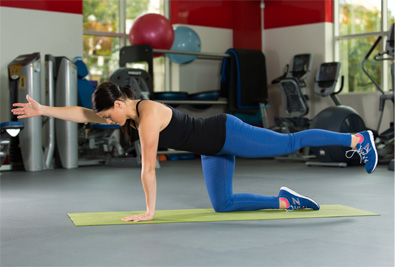
Assume an all-fours position, with hands shoulder-width apart and knees hip-distance apart. Brace the core and extend your right leg behind you. Keep the foot level with the hip. Next, extend your left arm forward with the thumb facing upward. Keep the hand level with the shoulder. Hold and repeat on the opposite side.
Plank
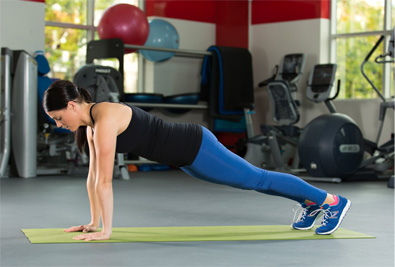
Assume an all-fours position, with hands shoulder-width apart and knees hip-distance apart. Extend the legs and place your weight on the balls of the feet. Keep the core braced and breathe deeply. To make the plank easier, keep the feet hip-distance apart; place the feet together to make the move more challenging.
Hip Bridge
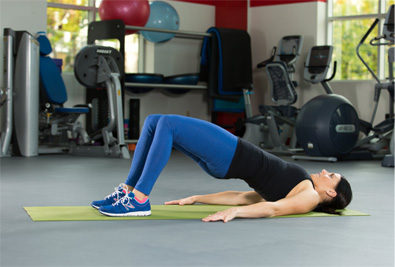
Lie on your back and place the feet onto the floor, hip-distance apart. Keep the arms by your sides with palms facing the floor. Lift the hips upward to feel the contraction into the hamstrings, glutes and lower back. Hold for 20 to 30 seconds and slowly release back to the floor, one vertebrae at a time.
Side Plank
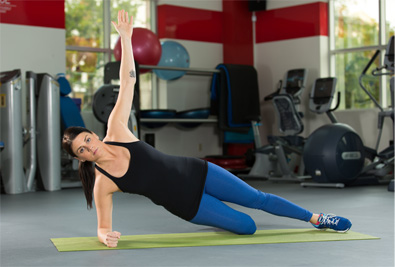
Lie on your right side and place your right forearm on the floor. Bend the right knee to 90 degrees and lift the hips off the ground. Reach the left arm above the shoulder, with the palm facing forward. Keep the right shoulder blade “down” and away from the ear. Hold and repeat on the other side.
Supine Toe Taps
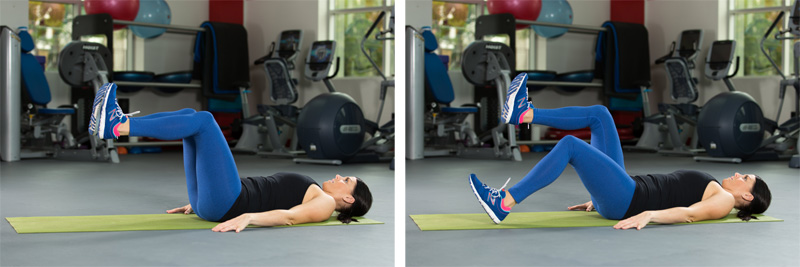
Lie on your back and bend the knees 90 degrees. Activate and brace the core. Exhale and, while keeping the right knee at 90 degrees, lower the leg to “tap” toward the floor. Return to center and switch to the other leg. Alternate legs while maintaining core stability. Don’t let the spine pop on and off the floor.
Mobility
Bird Dog With Elbow to Knee
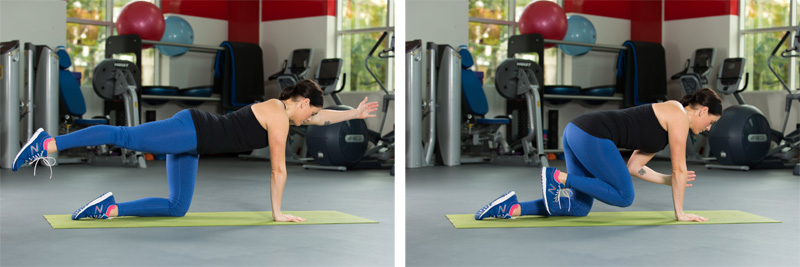
Assume an all-fours position, with hands shoulder-width apart and knees hip-distance apart. Brace the core and extend your right leg behind you. Keep the foot level with the hip. Next, extend your left arm forward with the thumb facing upward. Keep the hand level with the shoulder. Draw the left elbow and the right knee toward each other (most likely they will not touch) and then extend to the starting position. Complete one set on the first side and repeat on the opposite side.
Plank With Knee Drive
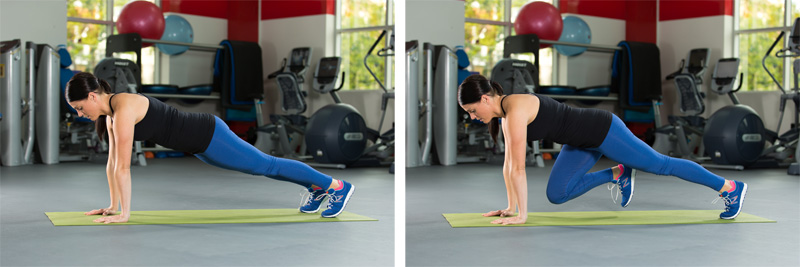
Assume an all-fours position, with hands shoulder-width apart and knees hip-distance apart. Extend the legs and place your weight on the balls of the feet. Keep the core braced and breathe deeply. Slowly, draw the right knee in toward the chest and release the foot back to the starting position. Alternate between driving the right and then the left knee forward.
Moving Hip Bridge
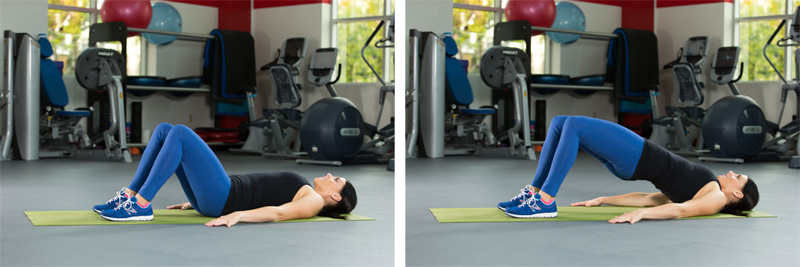
Lie on your back and place the feet onto the floor, hip-distance apart. Keep the arms by your sides with palms facing the floor. Lift the hips upward to feel the contraction into the hamstrings, glutes and lower back. Hold for three seconds and slowly release the spine and hips back to the floor. Continue lifting and lowering for your set.
Side Plank with Rotation
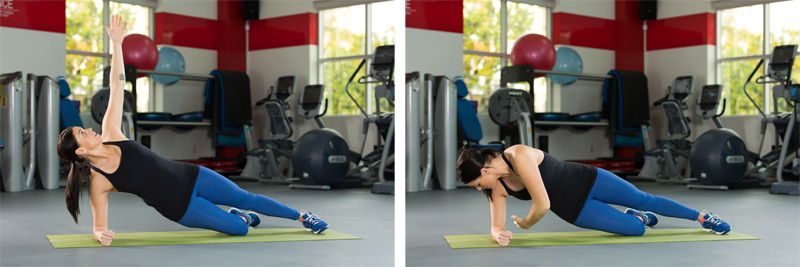
Lie on your right side and place your right forearm on the floor. Bend the right knee to 90 degrees and lift the hips off the ground. Reach the left arm above the shoulder, with the palm facing forward. Keep the right shoulder blade “down” and away from the ear. Rotate your ribcage toward the floor and draw the left arm under the ribs. Rotate back to center and extend the left arm. Continue your set and switch sides.
Supine Leg Extension
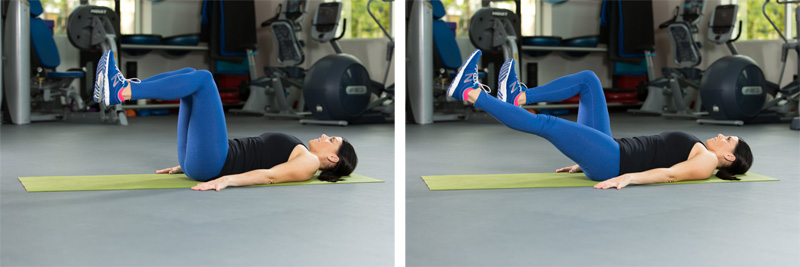
Lie on your back and bend the knees 90 degrees. Activate and brace the core. Exhale and push your right foot “away” to extend the right leg. Return to center and switch to the other leg. Alternate legs while maintaining core stability; don’t let the spine to pop on and off the floor.
Elizabeth Kovar, MA, has studied yoga in five different countries. Her master’s thesis, “Creating Yoga Programs for People with Movement Disabilities,” was implemented on a 12-week study for people with Stage 1-2 Parkinson’s disease. Based in Seattle, she serves as fitness coordinator at a local recreation center.


